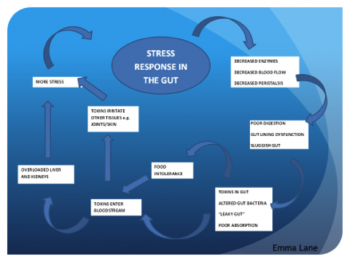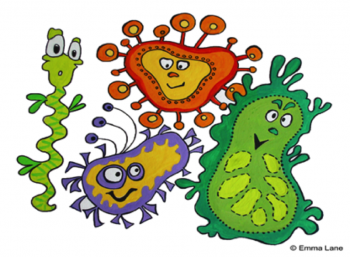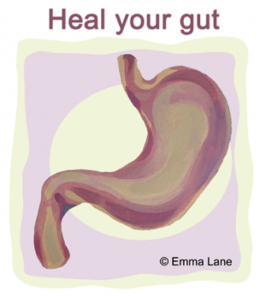Hormone imbalance and digestion dysfunction
Poor absorption of certain vitamins and minerals will result in hormone imbalance, so the function or dysfunction of the digestive system has a direct impact on pre-menstrual symptoms for example.
So how does digestion work?
When you eat, food starts to be digested in the mouth by the mechanical action of chewing and a release of enzymes in the saliva. The food then travels through your oesophagus. In the stomach, acids and enzymes break down the food into smaller particles. After leaving your stomach, these particles enter the small intestine. This long tube slowly contracts and expands to push the food along through it, while absorbing nutrients that your body uses for energy, growth, and repair. By the time the food reaches the end of the small intestine, almost all of its nutrients have been absorbed. At this point, what’s left of the food is mostly water and indigestible waste.
This material then enters the large intestine. Its main job is to remove water from the waste products as they pass through and then recycle this water back to your body. After traveling through this area, the waste is held at the end of the colon in the rectum. It will then leave your body through the anus as stool when you have a bowel movement
Key disrupting factors
There are many disrupting factors that affect the digestive process. These include Poor cephalic response, low hydrochloric acid, stress, liver congestion and dysbiosis
1. The cephalic response
The cephalic phase of digestion is when you stimulate a natural response to increase gastric secretions even before food enters the stomach, therefore supporting the breakdown of food in your digestive tract once the food is in there.
The cephalic response is stimulated when you see, smell, think about, or taste food. Therefore if you are not present with your food and mindful of eating you are not getting the optimal response and this results in poor breakdown, absorption and therefore poor digestion.
2. Low hydrochloric acid secreted by parietal cells in the stomach wall
Hydrochloric acid (HCL) is secreted by parietal cells in the stomach wall and its actions include:
- Denatures proteins and enhances nutrient absorption
- Activates pepsin from pepsinogen
- Supports barrier defence against ingested microbes
- Most B complex vitamins require normal levels of stomach acid for absorption.
- Fe, cu, mg, zn, ca require an acidic environment for absorption.
- Stimulates secretion of bile and pancreatic juices
Consequences of low stomach acid
Low stomach acid cannot properly break down proteins into amino acids. Lack of amino acids in the bloodstream means less available neurotransmitters which can mean mood disorders like depression. Additionally, protein maldigestion leads to hair loss and brittle nails.
Low stomach acid fosters imbalanced gut flora. Pathogenic and food borne bacteria, usually killed by the inappropriate stomach pH level, can make their way into the intestines. Further, lack of acidity in the stomach makes it more hospitable to bad bacteria colonistation.
Low stomach acid leads to nutrient malabsorption. Specifically, when proteins aren’t fully broken down, B12 absorption is disrupted. Folate and nonheme iron absorption are also affected by low stomach acid.
Low stomach acid also leads to heartburn, gastroesophageal reflux disease (GERD) or reflux.
Low stomach acid often means constipation, bloating, gas and belching. With inadequate acid, food sits in the stomach and putrefies instead of being properly digested.
Low stomach acid may cause a leaky gut (increased intestinal permeability) and therefore create food allergies/sensitivities. Improperly digested foods can create little “holes” between the cells of the intestinal lining. These undigested food particles can also create the opportunity for pathogenic bacteria to contribute to creating increased intestinal permeability. Then, undigested proteins and other food particles leak into the bloodstream and the body reacts by creating antibodies to these foreign particles in the blood.
Simple solutions to support HCL production include:
1. Sea salt for low stomach acid – add unrefined sea salt, such as Celtic sea salt with meals and to water and drink 15 minutes before you eat. This provides chloride, the building block of stomach acid (sodium chloride and hydrochloric acid).
2. Raw apple cider vinegar for low stomach acid – Low stomach acid causes a cascade of digestive issues like bloating, hair loss and constipation. There are a few theories regarding just why apple cider vinegar improves digestion and low stomach acid. First, the vinegar is acidic and will slightly lower the pH in the stomach. Frequent doses of raw apple cider vinegar is reported to help with candida overgrowth and candida problems can contribute to low stomach acid production.
3. Drink 1/2-1 tsp. raw apple cider vinegar in 1/2 cup warm water. Take this concoction before each meal and, if needed, after meals.
4. Swedish bitters for low stomach acid – Swedish bitters are an important tool in treating low stomach acid but is only part of the solution in healing low stomach acid naturally. To use put 1 tsp of Granary Herbs Swedish Bitters Liquid (purchase here) in water and drink 15 minutes before your two heaviest meals of the day
Other points to note:
Drinking large amounts of water during meals waters down stomach acid and therefore inhibits digestion.
Drinking a cup of warm, homemade bone broth can help to stimulate digestive juices and is also supportive to the health of the gut overall.
3. Stress
Perhaps the most important change is not to eat while stressed, as the body does not produce gastric juices when under stress. That means sitting down in a calm quiet environment for your meals, chewing well until each mouthful is almost liquid and eating mindfully.
You can see from the diagram below that having chronic low level of stress will have a radical effect on your health especially if you are rushed and stressed when eating.

4. Liver congestion
The liver is a natural multitasker: it plays a large role in metabolism, helps build proteins, breaks down hormones, clears toxins from the bloodstream, and much more.
Suboptimal detoxification signs
- Recurrent headaches
- Muscle aching and weakness
- Chronic fatigue and lethargy
- Recurrent infections
- Dark circles under the eyes
- Anaemia
- Infertility
- Depression, anxiety &/or mood swings
- Poor short term memory and concentration
- Adverse reactions / sensitivity to environmental chemicals, odours &/or nutritional supplements
Support your liver
- Eat good-quality food. Avoid overeating and refined or heavily processed food.
- Get plenty of fresh green leafy veg and keep a varied diet of fresh foods that is appropriate for your biochemistry.
- Maintain regular bowel movements this helps keep the bowels and liver clear of toxic load.
- Stay well hydrated.
- Minimise exposure to chemicals of all sorts, from food additives and cosmetics to caustic cleaning agents. Remember that the liver needs to break down every chemical entering the body either for use or excretion.
- Use recreational drugs and alcohol sparingly, or better yet, quit!
- Utilise Swedish bitters or a liver support supplement.
- Take time to breathe deeply, relax, meditate or pray. Stress can aggravate liver congestion.
5. Dysbiosis
Dysbiosis is an imbalance in the colonies of the bowel flora and the effects that the by-products have on human physiology. Published research has listed dysbiosis as the cause of arthritis, autoimmune illness, B12 deficiency, chronic fatigue, cystic acne, the early stages of colon and breast cancer, eczema, food allergy/sensitivity, inflammatory bowel disease, irritable bowel syndrome, psoriasis, and steatorrhea.

Causes of intestinal dysbiosis
- Stress
- Poor diet/nutritional status
- Antibiotic/other drug therapy
- Decreased immune status
- Decreased gut motility
- Maldigestion
- Intestinal infection
- Diabetes
- Gastrointestinal tract surgery
Common symptoms of Dysbiosis
- Disturbed bowel movements – either diarrhoea or constipation, or a combination of both.
- Excessive wind
- Abdominal distension/ bloating
- Fatigue
- Hormonal imbalances.
- Foggy thinking.
- Anxiety, depression or mood swings.
- Chronic vaginitis (vaginal irritation)
- Dysbiosis can affect almost every aspect of health.
To learn more about the healthy digestion process and what can go wrong, why not read some of our other blogs?
To understand the far reaching effects of digestion check out Emma Lane’s comprehensive course Holistic Approaches to a Fully Functional Gut. The next course will run on 11-12th April in Middlesex. Book now. Emma will also running this course in Fort Lauderdale on April 18th/19th and in Carlsbad on August 1st/2nd.

Courses
Mission Statement
Our vision is that health practitioners can develop the skills and knowledge to employ a variety of practical methodologies that safely bridge the gap between conventional Western medicine and holistic healthcare practices.
Through our training courses we aim to give practitioners, whatever their approach to health and wellbeing, the knowledge, skills and tools that will enable them to deliver the best possible approaches to resolve their patients or client’s health challenges.
© Integrative Health Education 2014-2024 | Terms & Conditions | Privacy Policy
